Raccoons are wild animals known for their distinct black mask that runs across their eyes and a bushy tail with alternating light and dark bands. Interaction with these animals could cause severe problems as their feces carry infectious diseases, which can be transmitted to both humans and animals.
Is raccoon feces dangerous and toxic to humans and pets? Raccoon feces most likely contain eggs of the raccoon roundworm, Baylisascaris procyonis, which is highly detrimental to humans and animals. Ingestion of infective larvae may lead to organ and tissue damage, blindness, severe neurological deficiency, or death.
Given the severity of the raccoon roundworm infection, knowing the dangers of getting exposed to raccoon feces and the possible ways to control nearby raccoons is essential.
Raccoon Feces Identification
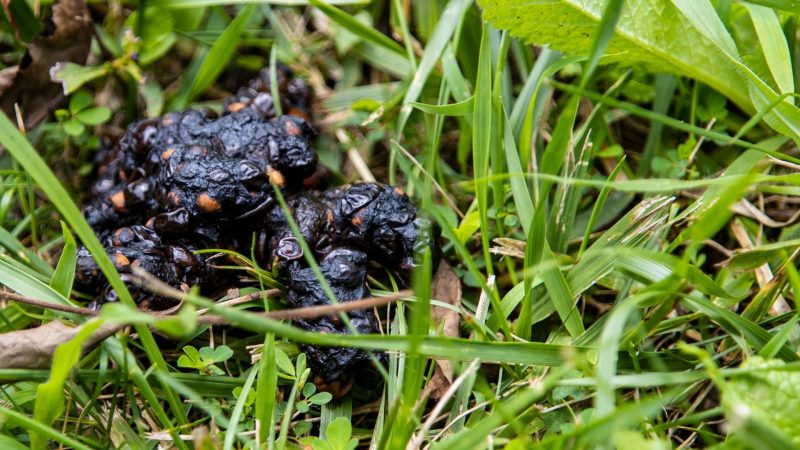
Raccoons are known to be omnivores. They are mainly meat-eaters but also consume as much plant material as animal matter. Raccoon scats vary in form depending on their diet.
One can identify scats or droppings of raccoons by examining their size, width, and form.
What Does Raccoon Feces Look Like?
Raccoon feces appear similar to that of foxes, skunks, weasels, and other carnivorous mammals. Their feces are usually dark-colored and tube-shaped, about 3 1/2 to 7 inches (8.9 to 17.8 cm) long and 5/16 to 1 3/16 inch (0.8 cm to 3 cm) in diameter.
The thickness of scats is most likely uniform as it is related to an animal’s anatomy. For this reason, diameter is a commonly preferred metric compared to length.
Raccoon feces are known to emit a pungent odor. Moreover, they usually contain undigested seeds, berries, beetle parts, and other food items.
What Do Fresh Raccoon Poops Look Like?
Fresh raccoon scats are dark-colored, moist, and shiny. On the other hand, dry fecal matter tends to whiten and easily break down when left in the open for several days.
Where Do Raccoons Poop?
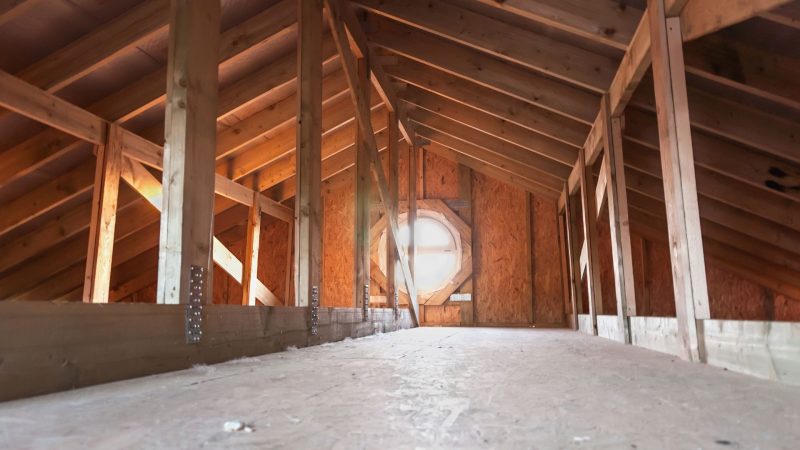
Communal latrines are sites where raccoons defecate repeatedly. Raccoon latrines are usually found in natural (bases and raised forks of trees, fallen logs, stumps, and huge rocks) and human environments (garages, attics, decks, rooftops, and haylofts).
Do Raccoons Poop in the Same Spot?
Raccoons do not defecate anywhere. These animals habitually poop in the same place, generating piles of feces called raccoon latrines. Latrines may be associated with the mating and mate defense behavior of raccoons.
Raccoons may defecate from one latrine site to another, visit as many as six latrines in a two-week period.
Raccoon Feces in Pool Water
Although raccoons are known to defecate in the same spot, they also tend to be attracted to areas with human activity. Thus, raccoon feces can often be found in pools, particularly in shallow areas.
Raccoon Feces in the Attic
Raccoons may also find their way into attics where they are likely to create communal latrines. Common entry points are torn or missing screens in vents and chimneys. Moreover, female raccoons are also known to create holes, expand existing holes, and rip open shingled roofs in search of shelter.
To gain access to these areas, raccoons only need small holes or openings of about 4 to 6 inches (10.16 to 15.24 cm) for them to fit through.
With raccoons repeatedly depositing fresh feces on top of old feces, piles of scats of different ages are often found in attics.
Do Raccoons Poop on Lawns?
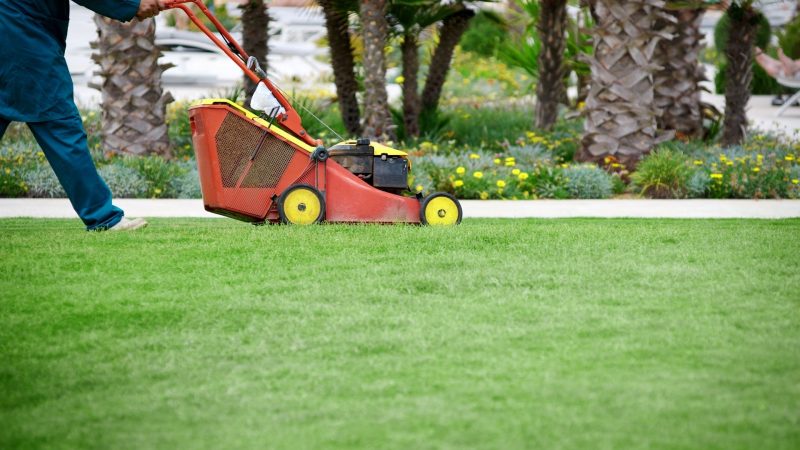
Raccoons may poop on the lawns in your yard; however, the main reason for raccoons’ presence in lawns is to dig the turf in search of worms and grubs.
Why Do Raccoons Poop in My Yard?
Aside from the shrinkage of their natural habitats, raccoons are known to visit yards and gardens as these areas offer a good source of food as well as potential communal latrines.
However, frequent raccoon visitation should not be tolerated. When overlooked, these raccoons can fill the yard with piles of poop and cause severe damage to houses, plants, and other nearby structures. Since raccoons often forage at night, tracks, droppings, and evidence of feeding should regularly be observed.
Do Raccoons Bury Their Feces?
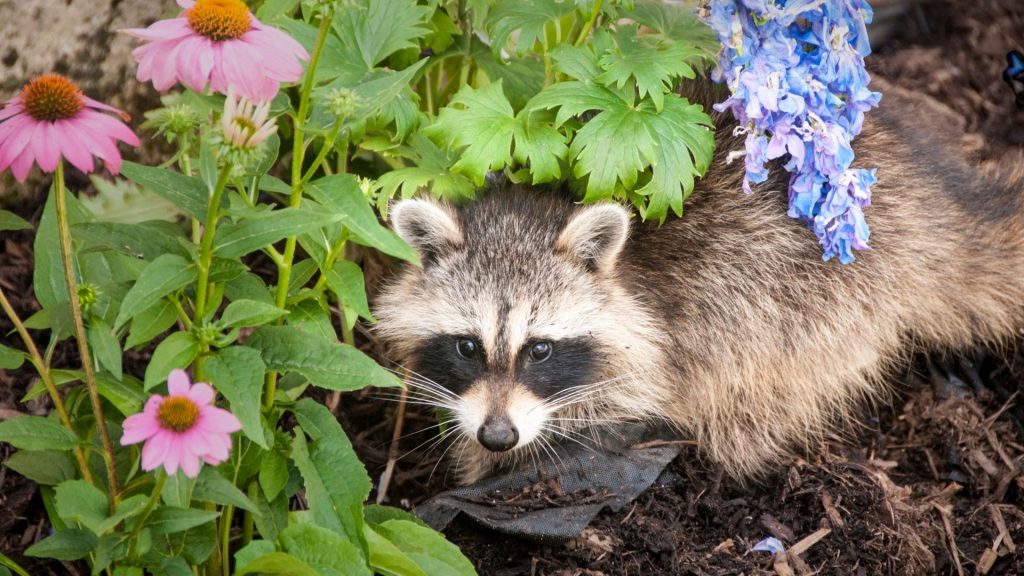
Raccoons do not bury their poop. They defecate communally and leave their feces in their chosen communal sites. These communal sites are usually filled with piles of raccoon scats with fresh ones on top of the old, dry scats.
Are Parasites Present in Raccoon Feces?
Raccoons carry several infectious diseases and parasites that could pose significant risks to human and animal health. In particular, raccoon feces contains eggs of deadly raccoon roundworms called Baylisascaris procyonis.
Raccoon Feces Roundworm
Raccoons are known to be the definitive hosts of raccoon roundworms. Adult roundworms are about 6 to 8 inches (15 to 20 cm) long and about 0.39 inches (1 cm) thick. Multiple worms could live in the intestines of raccoons, where they lay more than 45 million eggs per day.
Transmission can occur via accidental ingestion of infective eggs that have been shed in raccoons’ feces. Roundworm eggs found in fresh raccoon feces are not infectious, as it takes 11-14 days for larvae to develop within the egg (embryonated) and become infective. With adequate humidity, these eggs will survive for several years in the environment.
Small birds, rodents, squirrels, and rabbits commonly act as intermediate hosts of raccoon roundworms. When these intermediate hosts become infected, the eggs will hatch, and the larvae would begin penetrating the intestines. These larvae would also migrate into various organs and tissues where they would undergo encystment.
The life cycle of raccoon roundworm gets completed when raccoons consume these intermediate hosts. The larvae are released from the cysts and migrate to the small intestines of raccoons, where they develop into adult roundworms.
These roundworms do not harm raccoons, except that they feed on nutrients that the raccoon has digested. Moreover, raccoons infected with raccoon roundworms would typically show no signs of infection.
Definitive hosts such as raccoons and dogs can be treated with anthelmintics drugs.
Is Raccoon Feces Dangerous for Humans?
Raccoon feces are dangerous to humans. When humans accidentally ingest the eggs of roundworms found in raccoon feces, they can become infected with baylisascariasis. Baylisascariasis could cause organ and tissue damage and severe neurologic and ocular diseases.
Humans can also get infected by hand-to-mouth contact with contaminated items such as soil, wood, and leaves, commonly found in raccoon latrines.
Children (9 months to 6 years) are more at risk of infection, especially since they have a habit of putting anything in their mouths. Cases of disease in adults and children have been reported in Canada, the US (Washington, Illinois, and California), Europe, and Japan.
Signs may appear two to four weeks after ingestion of infective larvae. Baylisascariasis disease may cause visceral larva migrans (VLM), ocular larva migrans (OLM), and neural larva migrans (NLM), which will be elaborated on below.
1. Visceral Larva Migrans
Visceral larva migrans result from the migration of roundworm larvae into various internal organs. Signs of infection may include nausea and lethargy. Larvae invasion may result in swelling of the liver, while migration through the lungs can lead to pneumonitis.
2. Ocular Larva Migrans
Ocular larva migrans are more common in reported cases of baylisascariasis. This condition results in visual impairment and blindness, often in one eye due to the migration of roundworm larvae.
3. Neural Larva Migrans
Neural larva migrans are the most severe condition compared to VLM and OLM. NLM results from the migration of larvae to the central nervous system, causing damage to the brain and spinal cord. Signs of NLM may include lethargy, irritability, lack of muscle coordination, hyperreflexia, seizure, and paralysis.
Advanced NLM infection often leads to coma or death of the patient.
There is currently no known optimal treatment for baylisascariasis, but early detection might reduce damage caused by the infection. In some cases, albendazole and steroids are used to treat the disease. However, full recovery is unlikely once the condition becomes advanced and patients remain severely neurologically disabled.
Can Cats Get Sick From Raccoon Feces?

Cats commonly defecate in gardens where raccoon scats may be present. Thus, they are likely to get infected with raccoon roundworms and act as an intermediate host of these parasites. While infections in adult cats can be treated, infections in kittens are often fatal.
Moreover, since these parasites invade their host’s brain, the infection is often mistaken as rabies. Cats infected may exhibit a lack of attention, circling, lethargy, ataxia, and difficulty eating or swallowing.
What Diseases Do Raccoons Give to Dogs?
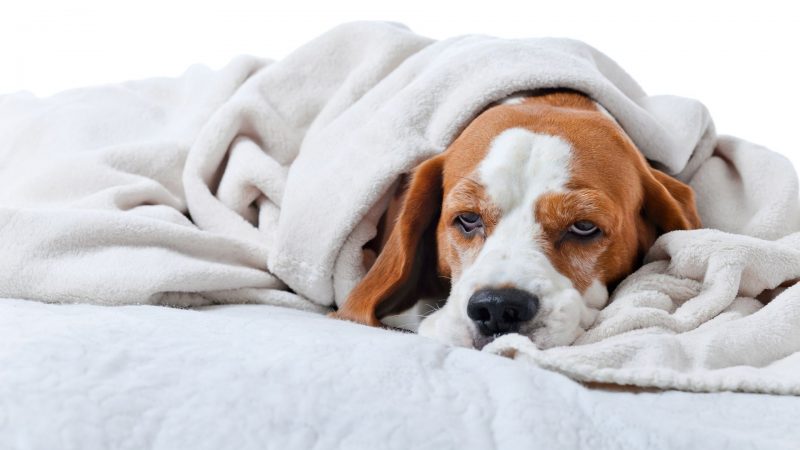
Raccoons are primary carriers of rabies, alongside other mammals (skunks, coyotes, and foxes). They can also be carriers of canine distemper and deadly parasitic roundworm. Below are the following diseases that raccoons can give to dogs:
1. Rabies
Rabies is a viral disease that can be transmitted from raccoons to dogs through bites or contact with mucous membranes in the nose, mouth, and eyes. This disease is treatable; however, rabies is almost always incurable and fatal once the symptoms occur.
Rabies virus infection could be prevented through vaccination and by avoiding interaction with potentially infected animals.
2. Distemper
Unvaccinated dogs could also become infected with canine distemper when exposed to an infected raccoon. Canine distemper is a highly contagious and fatal disease. Signs of canine distemper in raccoons and dogs may include lethargy, disorientation, and mucous discharge from the nose and eyes.
3. Roundworm
Feces of raccoons are likely to contain eggs of raccoon roundworms. Dogs become infected through direct contact or ingestion of soil or plant material containing embryonated roundworm eggs.
Once ingested, the larvae would penetrate the intestinal walls and migrate throughout the body causing extensive damage to affected organs and tissues as it continues to grow.
Neurologic signs of infection in dogs include behavioral changes (ataxia, circling, head pressing, recumbency, and paddling) and tremors. Severe cases of infection usually lead to coma or death.
The severity of the disease generally depends on the number of ingested larvae as well as the age and size of the infected animal.
Dogs typically act as intermediate hosts of raccoon roundworms. However, there are rare cases where dogs act as definitive hosts and harbor adult worms in their intestines and eventually shed eggs in their feces.
How to Get Rid of Raccoon Feces?
Raccoons thrive in close proximity to humans, especially in suburban areas. Given the susceptibility of humans and animals to raccoon roundworms and the severity of infection caused by these parasites, it is critical to regularly clean potential latrines to reduce exposure and environmental contamination.
In areas with a high risk of exposure, hiring professionals to do the cleanup would be best.
How to Clean up Raccoon Feces in Attics?
Attics are one of the most common locations of raccoon latrines. Raccoons denning in attics would result in piles of feces, which could pose serious problems.
Before cleaning, it is important to wear protective gear such as disposable masks, gloves, rubber boots, and coveralls to avoid contact with raccoon feces and other contaminated objects. For confined areas such as attics, the use of N95-rated masks is necessary to prevent accidental ingestion of roundworm eggs and fungal spores.
To clean the attic:
- Use a shovel and a heavy-duty garbage bag when removing and disposing of feces and contaminated insulation materials.
- Twist-ties may be used to close the garbage bags securely. Double-bagging is recommended to reduce contamination of the external surface of the garbage bag.
- Disinfect contaminated surfaces in your attic using boiling water.
- Once cleaning is done, wash your hands thoroughly with soap and warm running water, and launder your clothes with hot water and detergent.
Repair holes or torn air-vent and chimney screens to prevent raccoons from returning.
How Do You Clean a Pool After Raccoon Poop?
Adding chlorine will not kill the eggs of raccoon roundworms.
To get rid of raccoon feces in swimming pools:
- Filter the pool water for at least 24 hours
- Backwash the pool filter to dislodge all the trapped dirt.
- If possible, it is recommended to discard the used filter material as it might be contaminated with roundworm eggs.
- Keep raccoons out by covering the shallow areas of the pool with a plastic sheet or plastic panels.
How Do You Get Rid of Raccoon Poop in Your Yard?
When cleaning yards filled with raccoon feces, it is essential to wear protective equipment such as disposable coveralls, gloves, rubber boots, and face masks.
To clean raccoon latrines in yards:
- Raccoon droppings and other contaminated materials should be removed and disposed of using a shovel or inverted plastic bags and, if possible, incinerated immediately afterward.
- Potentially contaminated surfaces (concrete and metals) could be flamed up using propane torches as roundworm eggs are highly susceptible to heat.
- In the case of soil contamination, repeated removal and breaking of topsoil and flaming up is recommended.
- Boiling water and steam cleaners may be used to disinfect surfaces that cannot be burned.
Raccoon visitations are likely due to the availability of food and potential latrine sites in your area. Thus, keeping them out means depriving them of access to food sources and latrine sites. To keep them out, do the following:
1. Remove Food Sources
Discourage raccoons from coming into your yard by removing bird feeders and pet food bowls that may contain traces of food. Also, remove containers that may hold water, as these would serve as water sources for foraging raccoons.
Moreover, raccoons may also scavenge through garbage cans. Thus, it is important to seal each trash bag as raccoons might get attracted to the smell of the garbage. Heavy rocks may also be placed on top of the lid to keep trash cans closed. If possible, you may purchase raccoon-proof garbage cans.
2. Remove Potential Latrine Sites
Another way to make your property uninviting is by removing junk and woodpiles where they could potentially create latrines.
What Should You Do if You Are Exposed to Raccoon Poop?

Raccoon droppings may contain eggs of roundworms, which can be detrimental to humans. Currently, there are no widely available tests to diagnose baylisascariasis disease. Infected raccoons would also show no signs of infection; thus, medical attention should be sought immediately once exposed to raccoon feces.
Depending on the number of ingested eggs, some people would show no clinical signs. On the other hand, commonly reported symptoms would include nausea, lethargy, irritability, liver enlargement, ataxia, and loss of eyesight.
Related: Natural Raccoon Repellents That Work | Control Guide
List of Sources
Baldwin, R. A., et al. (2014). Pests in Gardens and Landscapes: Raccoons. University of California, Agriculture and Natural Resources – UC IPM.
Caudell, J. (2010). Protecting Yourself From Wildlife Diseases: Raccoon Roundworm (Baylisascaris Procyonis). Purdue University, Extension – Entomology.
Baylisascariasis. (2013). Center for Food Security & Public Health.
Correa-Prisant, M. (1997). Rabies. North Carolina Department of Agriculture & Consumer Services.
Ober, H. K., Kane, A. (2018). How to Identify the Wildlife Species Responsible for Damage in Your Yard. University of Florida, IFAS Extension.
- How to Get Rid of Copperheads | Practical Guide - August 27, 2023
- How to Get Rid of Corn Snakes | What Makes Them Aggressive? - August 27, 2023
- How to Get Rid of Alligators | Safety Measures and Removal Methods - July 16, 2023
